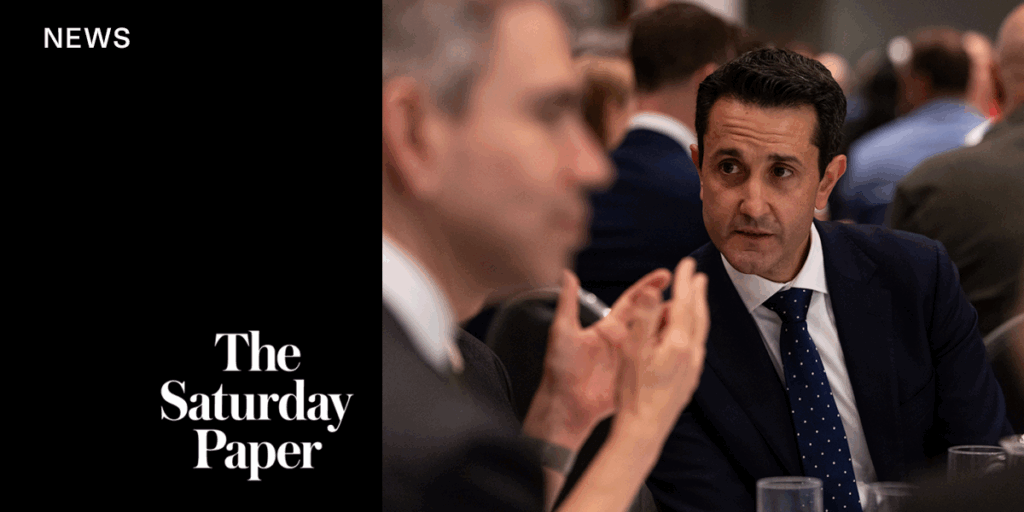
In his first 12 months as Queensland Premier, David Crisafulli has emerged as a unique figure in Australian politics—a moderate leader of the Liberal National Party (LNP) navigating the complexities of governance with a cautious approach. Crisafulli’s leadership style is notably influenced by the tumultuous tenure of former Premier Campbell Newman, whose government, despite a landslide victory, lasted only a single term and left the LNP in opposition for nearly a decade.
Crisafulli, who served as the local government minister during Newman’s administration, has seemingly internalized the lessons from that period. A witness to the era remarked,
“They’ve seen what happens when you unleash unbridled animal spirits.”
This historical context has shaped Crisafulli’s slow and steady approach to governance, evident in his first year in office.
Election Success and Legislative Moves
In the October election, Crisafulli secured 52 of the 93 seats in Queensland’s unicameral parliament, with Labor winning 35 and six crossbench MPs, including one from the Greens. This significant majority might suggest a secure second term, yet Crisafulli remains vigilant, avoiding complacency.
His government has engaged in some culture war skirmishes, notably limiting puberty blockers for transgender children and banning community pill testing. His first act as premier was to close the state’s First Nations truth-telling inquiry and halt the progression of a Treaty. Additionally, the Crisafulli administration introduced laws to try some children as adult offenders under the slogan “Adult Crime. Adult Time.” These measures, although supported by Labor, have faced criticism from the Human Rights Law Centre for potentially violating the Queensland Human Rights Act.
Blake Cansdale, national director of Change the Record, criticized these policies, stating,
“These policies do nothing to address the root causes of youth crime—intergenerational trauma, poverty, systemic racism and inadequate access to culturally safe support services.”
Cultural and Political Dynamics
Despite these controversies, Crisafulli has expressed a desire to avoid being defined by culture wars. At the LNP state council, he declared, “We don’t exist for culture wars.” This sentiment was echoed on election night when he excluded former Queensland senator Amanda Stoker, known for her hard-right stance on issues like abortion, from his cabinet.
While Crisafulli has maintained a moderate stance, his deputy, Jarrod Bleijie, occasionally highlights the party’s right-wing tendencies. Bleijie supported Queensland’s decision to become the first state to outlaw pill testing, a move aimed at protecting drug users from harmful substances. Observers have speculated about traces of “Trumpism” in Bleijie’s approach, but Crisafulli defended him as a “strong, conviction politician.”
Energy Policies and Economic Challenges
The premier’s approach to energy policy reflects a balancing act between economic and environmental considerations. While Crisafulli supports net zero emissions, he has not committed to intermediate targets, prolonging reliance on coal and gas power. This stance is partly influenced by the federal schism over renewable energy and net zero targets, with Queenslanders like federal Nationals leader David Littleproud and Senator Matt Canavan leading the charge against these goals.
Queensland’s significant coal production—224 million tonnes in the year to May—further complicates the transition to renewables. Crisafulli’s policy focus remains on lowering the cost of living and avoiding internal party conflicts.
Economically, Crisafulli’s administration faces challenges in managing government finances while pursuing ambitious housing goals. His $2 billion Residential Activation Fund is a cornerstone of the Securing our Housing Foundations Plan, aiming to build one million new homes by 2046. However, funding these initiatives without increasing taxes remains a challenge, as payroll tax contributes approximately $1.8 billion to government revenue.
Public Perception and Future Prospects
Public opinion on Crisafulli’s leadership is mixed. While some polls indicate erosion of LNP support by One Nation, a recent DemosAU poll shows the Crisafulli government with a two-party preferred rating of 54 to 46, mirroring its election performance. This suggests a stable political environment, yet the rise of One Nation highlights potential vulnerabilities in the LNP’s base.
Crisafulli’s pragmatic approach has drawn comparisons to federal Labor leader Anthony Albanese, who has similarly adopted a cautious policy strategy after years of political turmoil. Both leaders, having experienced extended periods in opposition, appear committed to avoiding the pitfalls of overambitious agendas.
As Crisafulli navigates his second year in office, his ability to balance competing demands from various political factions and address pressing local issues, such as e-bike safety regulations, will be critical. His leadership will continue to be tested as he seeks to maintain stability and deliver on his policy objectives.







